Family value: Support system of sportspersons
Parents, spouses and siblings are often a sportsperson's first line of defence. Without them, a career in sports would often not be possible


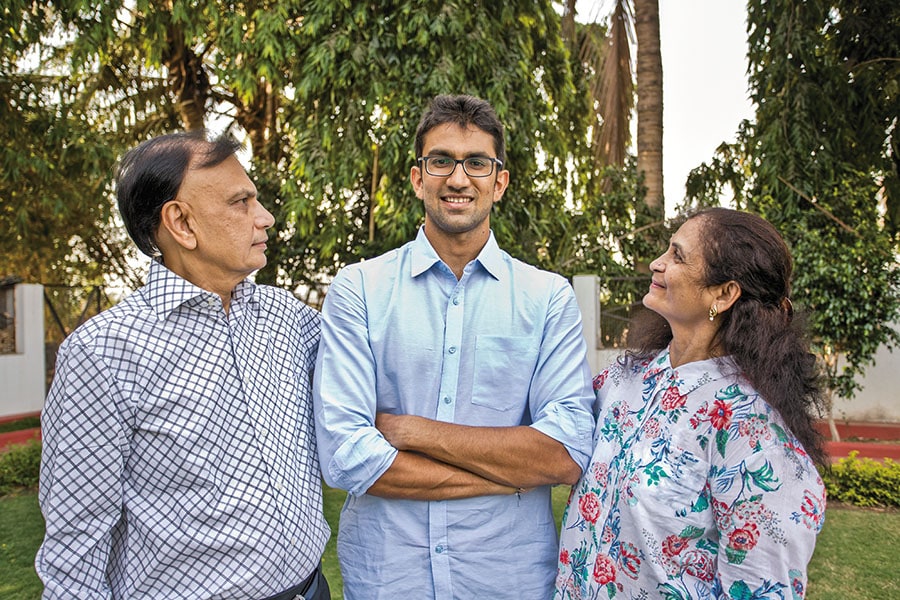 Swimmer Anshul Kothari wth his parents Ketan and Sushma, who drove him to practice for years
Swimmer Anshul Kothari wth his parents Ketan and Sushma, who drove him to practice for years
Image: Nikhi Patel[br]For 10 years, Sushma Kothari woke up at 3.30 in the morning to make breakfast. If she got late, she would not be able to reach the swimming pool on time for practice, which began at 4.45. Since getting any kind of public transport was a near impossibility at that time in Surat, she learnt how to drive. After training, which got over at 7 am, she drove to school. After school there was swimming practice again, from 5.30 pm to 9.30 at night. Then she drove back home, and made dinner.
Sushma is not a swimmer. Her son Anshul is.
Much has been written about the toil, dedication and single-mindedness of those who excel in sports. Books and films have been dedicated to the long and arduous journeys of those who emerge successful, taking on and defeating world champions. And yet, it is a legion of unsung, unknown and sometimes even unacknowledged heroes who make it possible for these sportspeople to become champions who first lead, and then follow, in their every step who sacrifice their own needs, lives, careers, ambitions, and social obligations at the altar of someone else’s success. These heroes are the families of sportspeople.
“My parents worked really hard to make it possible,” says Anshul, 29, who represented India at the Asian Games in 2010 and 2014, the 2010 Commonwealth Games, and was part of the gold-winning team in the 4×100 m Freestyle Relay at the 2011 and 2015 Asian Championships. “Most of the extended family, and society at large, would always say, ‘What will you achieve from sports?’”
“But we always told everyone else, ‘Let him do what he wants whatever he does, he’ll do well’,” says Sushma.
This unwavering faith in their child’s abilities and dedication is sometimes the strongest pillar of strength that makes it possible for youngsters to take initial steps into the sporting world, and continue on the path of unending physical and mental rigour.
Molly Jose would know. “My parents were not sportspersons, but they were interested in sports,” says the 49-year-old resident of Wayanad in Kerala, who was captain of the Indian women’s cricket team from 1985 to 1991. “They believed that it would help me get a job, when no one else did.” Molly eventually quit cricket in 1992. “There were no opportunities and no facilities, there weren’t even phones most of the time,” Molly recalls. “We didn’t speak any other language apart from Malayalam, and found it difficult to communicate with people from other places. We did not know where the training camps were being held, or would reach there and find that they were over. Cricket was popular, but there was nothing for women cricketers… I felt that I was wasting my years,” she says of her decision to turn homemaker.
But today, Molly could not be more proud. Her daughter, Josna Christy Jose, 22, is a fencer who won the under-17 National Championship in 2012, and has represented India at the Grand Prix in Seoul and the Asia Fencing Championships in Bangkok last year. “I am very happy for her,” says Molly, who has been unrelenting in her support of Josna. “She will get all the facilities that she will need. And today language is no longer a problem.”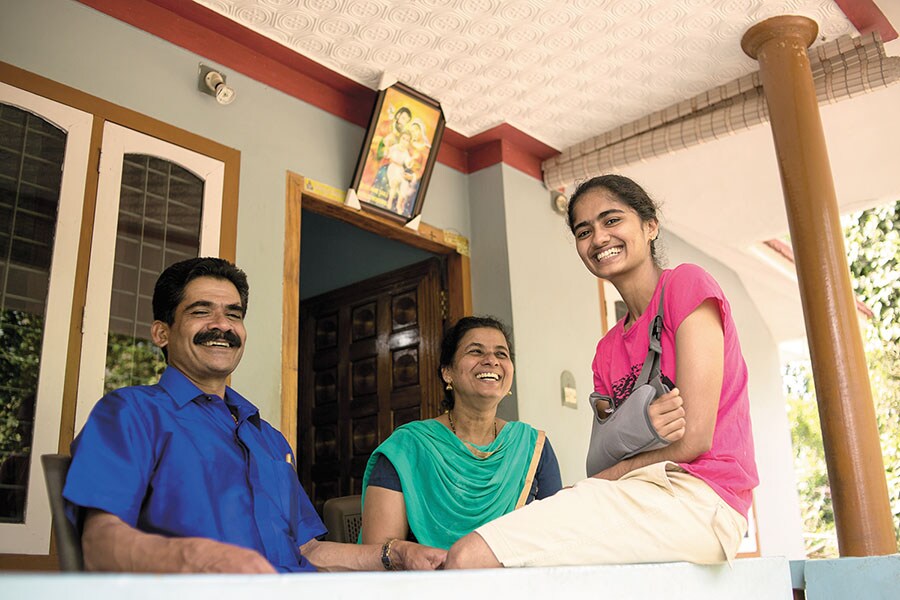 Much of fencer Josna Jose’s career has been funded by her parents Molly and TJ Jose
Much of fencer Josna Jose’s career has been funded by her parents Molly and TJ Jose
Image: Arjun Suresh[br]“My parents are simple, regular people they are farmers,” says Josna, who was home for a surgery to fix a shoulder injury she sustained while training at the Sports Authority of India facility at Thalassery. “Everyone in the family was worried when I took to sports, because they have seen what happened to Ma. But my parents have been supportive of my sporting career.” Although women’s cricket has caught the country’s imagination now, fencing still has a long way to go. “Nobody knows anything about fencing. Even in office [Josna has been working at a police office in Kannur for the past year], no one knew about fencing. Everyone just kept telling me that I should get a job.”
Perceptions towards her choice of career changed for the better in 2015, when she was part of the gold-winning teams at the 35th National Games, and at the 25th Senior National Fencing Championship, among others. “I was in class 12, and I began to perform well at fencing. I won seven golds that year.”
“When she won gold at the National Games, the rest of the family was happy,” says Molly. “Now they have all accepted it.”
*****
One of the most crucial aspects of parental support comes in the form of money, required for training, travel, and equipment.
“Managing finances is difficult, since training for any Olympic sport is extremely expensive,” says Anshul. “Most people believe that swimming does not need much money all you need is a pair of swimming trunks, a cap and goggles. But competition grade trunks can cost Rs 20,000, and can be worn only four to five times.” He also rues the fact that swimming is not a visible sport: “It’s not like cricket, where you can wear a jersey plastered with names of sponsoring companies!”
For Josna, too, funding came entirely from her parents during the initial years. “Fencing is an expensive sport. There was no financial support from the government, even when we represented India in international tournaments,” she says. “In 2018, when I went to Canberra, Australia, for the Senior Commonwealth Fencing Championship in November, my parents paid for all the expenses.”
It was only in 2017 that the Kerala government announced cash rewards for winners of National Championships, while in 2018, it announced a quota in select government jobs for sportspeople who have won medals at national-level games or tournaments organised by the state. Thanks to the latter, Jose now works at a police station, and juggles her job with training and a daily commute of an hour and a half. “Now I am earning from competitions, and I also have a job. But I also know that getting a monthly salary of Rs 19,000 is not much,” she says.
Having something to fall back on was always on Kothari’s mind, too. Not only did he complete his graduation from Sardar Vallabhbhai National Institute of Technology, in Surat, he also followed it up with an MBA from the Indian School of Business in Hyderabad.
*****
Parents providing money for their children’s career is one thing, foregoing their own career for it, is quite another.
When Harvir Singh Nehwal—a PhD in agricultural science, who worked at the Chaudhary Charan Singh Haryana Agricultural University—moved from Hissar in Haryana to Hyderabad, it was for a job at a position that was considered to be the gateway to the directorship of the company. The family of four—Singh, his wife Usha, and daughters Chandranshu and Saina—did not know a word of Telugu, but Singh’s career prospects were good enough to make the move.
“But I got tied to Saina,” says Singh, as he remembers how Usha and he gave up everything else so that Saina could become a world champion in badminton. “People in my office knew about my qualifications and credibility. But it was not possible for me to go to Delhi or other places to attend meetings and conferences. Consequently, I did not get any promotion again, and remained at the same position.”
Singh narrates how he would take Saina—who became the first Indian women’s player to become World No. 1 in 2015—to practise badminton every morning and evening, riding 25 km each way on his scooter. When Usha took Saina to practice in the evenings, it meant Chandranshu remained alone at home for long hours. “My older daughter learnt how to do household chores on her own, because she was alone. When Usha came back with Saina late in the evening, she would be tired… so Chandranshu would get the food ready,” says Singh. “Saina did not learn how to do anything at home.”
“We did not attend any family functions in Haryana for many years, because we were tied to Saina’s training schedules,” Singh continues. 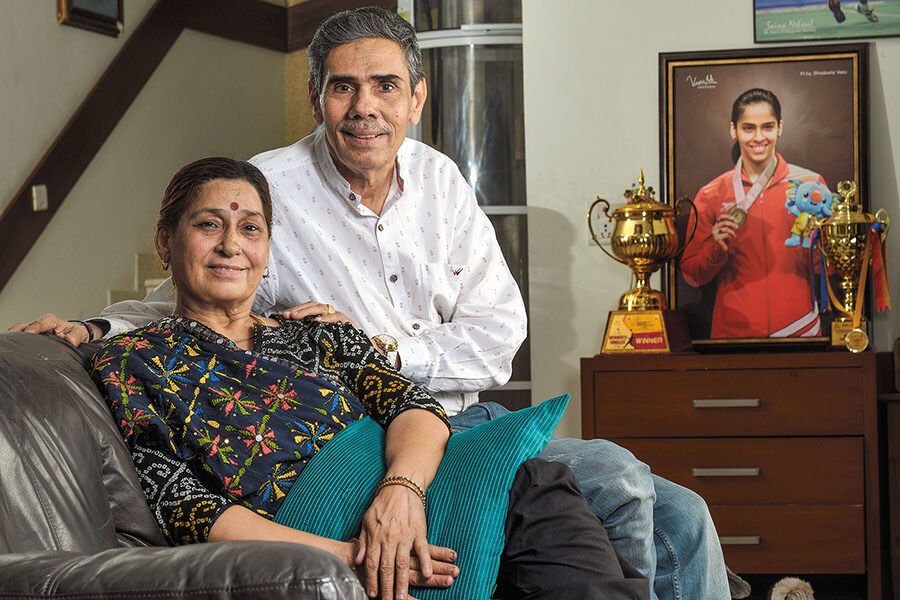 Badminton player Saina Nehwal’s father Harvir put his career on hold, and both he and his wife Usha put their all into helping Saina achieve her goals
Badminton player Saina Nehwal’s father Harvir put his career on hold, and both he and his wife Usha put their all into helping Saina achieve her goals
Image: P Anil Kumar[br]In their effort to ensure that Saina got the best of everything that she needed, Singh and Usha decided to include bone soup in her diet. “We are a vegetarian family. But we knew that this would be good for her. So we got a restaurant to prepare it, and convinced Saina to have it,” Singh tells Forbes India.
Singh recalls the years when Saina decided to move to Bengaluru to train under coach U Vimal Kumar in 2014. “We did not know anyone in Bengaluru, but Usha moved with Saina so that she could be with her at all times. She lived for three years at the training facility, with nothing to do the whole day, except watch Saina practise. She had no friends, or anyone to talk to.” In these three years, Singh himself lived alone in Hyderabad—his older daughter was married by then—with no one but his dog Chopsi for company. “Four, five of Saina’s expensive cars would just stand in the driveway, but I rarely went anywhere… and I still haven’t learnt a word of Telugu,” he says with a laugh.
Travelling with their children during tournaments is another aspect of support that is crucial for young sportspeople. “I would travel with Anshul whenever he went for competitions,” says Sushma. “While the participants were put up at sporting facilities, I would have to
find a suitable hotel, within my budget, to stay at.” Singh and Usha, too, travelled with Saina to different cities when she played. “We don’t do it anymore of course,” says Singh. “Only sometimes.”
*****
Travelling to international competitions with her famous husband was how Aruna Anand got introduced to the world of chess.
“Ours was a typically arranged marriage. But when Anand and I got married, he had already beaten [Russian Grandmaster] Garry Kasparov,” says Aruna. “Three days after the wedding, we were travelling to Germany for a competition.”
Not knowing anybody, or having any reference point, in the ecosystem, Aruna would find herself a seat at the back of the darkened auditoriums. “While Anand played up front, under bright lights, I would take a nap,” she recalls. “After the round was over, I would go to the ladies’ room, and wait for him to call me from outside.”
Aruna, of course, quickly learnt how things worked and became Anand’s manager. “When we got married, a lot of people had joked that Anand’s rank would begin to slide downwards, but the opposite happened,” she says with a laugh. “For him, it was refreshing that I didn’t know anything about chess. He also has a short attention span, and we quickly caught on to the fact that I was the more organised one in the marriage… and we developed a practical, working arrangement. He does not dwell on the details, I do.”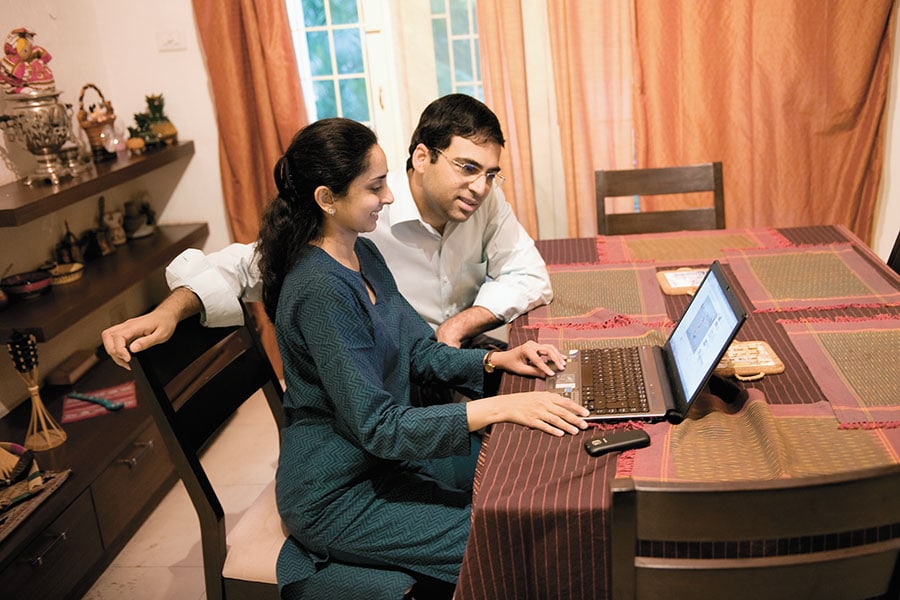 After her marriage to Viswanathan Anand, Aruna quickly learnt how things worked and became his manager
After her marriage to Viswanathan Anand, Aruna quickly learnt how things worked and became his manager
Image: Dinesh Krishnan[br]
Although Aruna now travels with Anand only once or twice a year, she says the home environment remains highly critical for a chess player. “His is not a 9 to 5 job. The home has to be conducive for him to practise in. Timings are sacred. We get invited to lunches and dinners, but we go only if his schedule allows it. His game is always the first priority. He is almost an honorary guest in the house!”
*****Years of single-minded focus and sacrifice can feel justified—even effortless—when looking back upon them from a position of success and fame. “We always had a feeling that whatever we were doing would turn out alright,” says Singh. “We had full faith in Saina. We never put any pressure on her, and instead motivated her to get ahead after every loss.”
But when there are dreams yet to be achieved, it is difficult to smile away the hard work. “Initially, I did not make it to the junior Indian team. It was only after eleven-and-a-half years of trying, that I made it to the Commonwealth Games team,” says Anshul. “It was a huge relief for my family.” His mother Sushma admits that although she would keep pepping up Anshul with “next time it will be better”, there were times of significant anxiety. “When we weren’t getting results, we would get emotional,” she says. “The big dream, of course, is the 2020 Olympics!”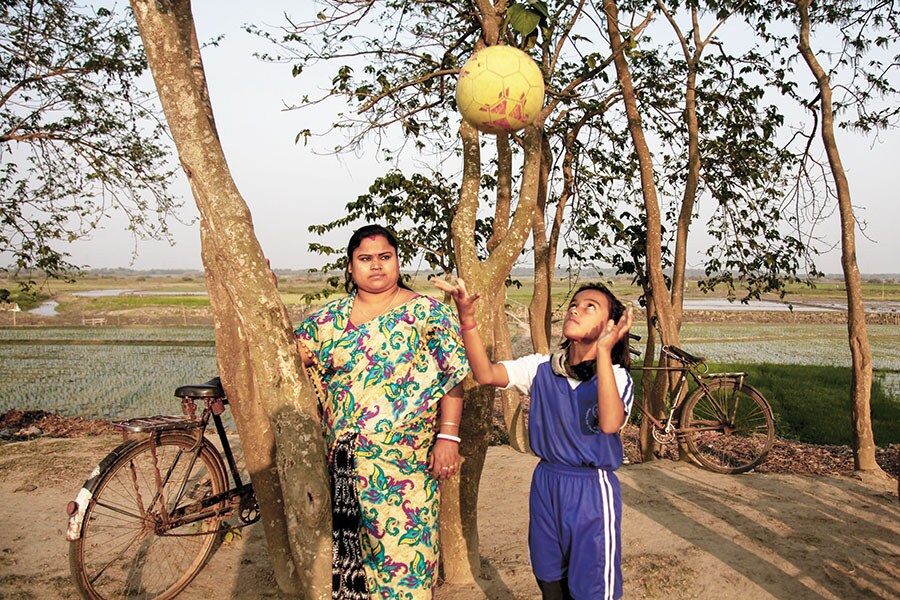 Tumpa Saha’s eight-year-old daughter Meghna is part of the recently introduced Baby League started by the All India Football Federation in West Bengal
Tumpa Saha’s eight-year-old daughter Meghna is part of the recently introduced Baby League started by the All India Football Federation in West Bengal
Image: Subrata Biswas [br]For some, though, it all begins with just having fun. “She would be playing football alone in the fields, and our only concern was she might get hurt,” says Tumpa Saha, 28, of Meghna, her eight-year-old younger daughter. A resident of Somra Bazar in the Hoogly district of West Bengal, Saha does not worry much about giving Meghna any special attention or diet. “We spent about Rs 200-Rs 250 on new shoes for her. Apart from that, there is not much else we can do.”
Meghna is part of the recently introduced Baby League, started by the All India Football Federation in West Bengal last year, to get football enthusiasts as young as under-eight into the fold. “We are all very happy,” says Tumpa, adding that she is not too concerned about her daughter’s performance in school for now, and would be happy if she takes to sports more seriously as she grows up.
First Published: May 25, 2019, 08:14
Subscribe Now